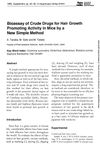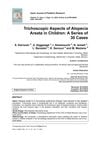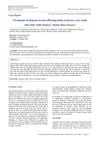 84 citations,
March 2010 in “Infectious Disease Clinics of North America”
84 citations,
March 2010 in “Infectious Disease Clinics of North America” The document concludes that rapid identification, isolation, and strict infection control are crucial to manage SARS outbreaks.
 78 citations,
January 2017 in “Skin appendage disorders”
78 citations,
January 2017 in “Skin appendage disorders” Biotin supplements may improve hair and nail growth in people with certain deficiencies or conditions, but there's not enough evidence to recommend it for healthy individuals.
 52 citations,
June 1981 in “International Journal of Dermatology”
52 citations,
June 1981 in “International Journal of Dermatology” Oral retinoids are effective for severe skin conditions but require careful use due to side effects.
 46 citations,
August 2003 in “The journal of investigative dermatology/Journal of investigative dermatology”
46 citations,
August 2003 in “The journal of investigative dermatology/Journal of investigative dermatology” Phosphatidic acid may help hair grow by affecting cell growth pathways.
 43 citations,
January 2013 in “Indian Journal of Dermatology, Venereology and Leprology”
43 citations,
January 2013 in “Indian Journal of Dermatology, Venereology and Leprology” The article concludes that advancements in hair cosmetics require dermatologists to stay informed about products and their potential risks, including allergies and higher risks for hairdressers.
 40 citations,
January 2010 in “Indian Journal of Dermatology, Venereology and Leprology”
40 citations,
January 2010 in “Indian Journal of Dermatology, Venereology and Leprology” Certain diets can affect skin conditions, but more research is needed to understand these relationships fully.
 39 citations,
April 2011 in “Recent Patents on Drug Delivery & Formulation”
39 citations,
April 2011 in “Recent Patents on Drug Delivery & Formulation” Nanoemulsion-based drug delivery systems are versatile and have potential for treating various medical conditions and improving vaccines.
 32 citations,
December 2017 in “Journal of Drug Delivery Science and Technology”
32 citations,
December 2017 in “Journal of Drug Delivery Science and Technology” Minoxidil and caffeine in transfersomes improve hair growth treatment.
 25 citations,
July 2013 in “Environmental Toxicology and Chemistry”
25 citations,
July 2013 in “Environmental Toxicology and Chemistry” Spironolactone harms fish reproduction and is more potent in fish than invertebrates, needing environmental monitoring.
 16 citations,
January 1980 in “Planta Medica”
16 citations,
January 1980 in “Planta Medica” Some natural extracts and one hair tonic can promote hair growth in mice.
 15 citations,
January 2016 in “Przeglad Menopauzalny”
15 citations,
January 2016 in “Przeglad Menopauzalny” Eating a balanced diet with specific nutrients is important for menopausal women to manage hair loss.
 10 citations,
April 2020 in “Clinics in Dermatology”
10 citations,
April 2020 in “Clinics in Dermatology” Biotin supplements improved skin and hair problems in a girl with biotinidase deficiency.
 8 citations,
January 2017 in “Elsevier eBooks”
8 citations,
January 2017 in “Elsevier eBooks” Certain nutrients can help keep skin healthy as we age.
 7 citations,
October 2019 in “Evidence-based Complementary and Alternative Medicine”
7 citations,
October 2019 in “Evidence-based Complementary and Alternative Medicine” Chinese medicine may help hair growth and reduce hair loss in androgenetic alopecia.
 5 citations,
December 1942 in “Journal of the American Medical Association”
5 citations,
December 1942 in “Journal of the American Medical Association” Choline and biotin are important for liver health and preventing certain deficiencies in animals, and more research is needed to understand their benefits in humans.
 4 citations,
January 2020 in “Frontiers in Physiology”
4 citations,
January 2020 in “Frontiers in Physiology” Good feather growth in poultry needs the right balance of proteins, amino acids, minerals, and vitamins.
 1 citations,
December 2022 in “Middle East Journal of Science”
1 citations,
December 2022 in “Middle East Journal of Science” Permanent hair dyes use chemicals that react with hydrogen peroxide to create color.
 January 2023 in “Asian Journal of Pediatric Research”
January 2023 in “Asian Journal of Pediatric Research” Trichoscopy is crucial for diagnosing and assessing alopecia areata in children.
 June 2022 in “Journal of Experimental Biology and Agricultural Sciences”
June 2022 in “Journal of Experimental Biology and Agricultural Sciences” Higher testosterone harms sperm motility, while higher estradiol improves sperm survival.
 February 2019 in “International journal of scientific reports”
February 2019 in “International journal of scientific reports” Unani medicine helped regrow eyebrow hair in 45 days.
 July 2018 in “International journal of clinical & experimental dermatology”
July 2018 in “International journal of clinical & experimental dermatology” Eat a balanced diet for healthy hair; only use supplements if you have a proven nutrient deficiency.
 January 2017 in “Springer eBooks”
January 2017 in “Springer eBooks” Eating a balanced diet with specific nutrients can help manage menopause symptoms and prevent related health issues.
 April 2016 in “Medical Acupuncture”
April 2016 in “Medical Acupuncture” The document concludes that hair loss in women is treated with medications, therapies, and surgery in Western medicine, and with acupuncture and herbs in Chinese medicine, but hereditary hair loss is hard to reverse.
 March 2023 in “International Journal of Advanced Research in Science, Communication and Technology”
March 2023 in “International Journal of Advanced Research in Science, Communication and Technology” Various medicinal plants like Polygonum multiflorum, Red ginseng extract, and Zizyphus jujuba can potentially treat hair loss, offering benefits like low cost and multiple ways of working. Other effective natural substances include Pygeum africanum, Seneroa, Urtica dioica, and more.
15 citations,
January 2016 in “International journal of trichology” Low vitamin D3 levels are significantly linked to hair loss, especially in female students.
 1 citations,
January 2018 in “Journal of Cosmetics, Dermatological Sciences and Applications”
1 citations,
January 2018 in “Journal of Cosmetics, Dermatological Sciences and Applications” Ostrich antibodies helped regrow hair in men with hair loss, but the application needs to be easier.
11 citations,
October 1941 in “Experimental Biology and Medicine” PABA helps prevent gray hair and hair loss in mice.
4 citations,
December 2020 in “Current sports medicine reports” Athletes usually get enough vitamins and minerals from a healthy diet, and supplements are only needed for those with actual deficiencies.
 1 citations,
May 2019 in “Bioactive compounds in health and disease”
1 citations,
May 2019 in “Bioactive compounds in health and disease” Certain vitamins, minerals, and foods like black raspberry extract and egg yolks can help reduce hair loss and promote hair growth.
1 citations,
January 2010 in “International journal of medicinal mushrooms” Ganoderma lucidum powder may help prevent skin cancer and lower cholesterol.


























